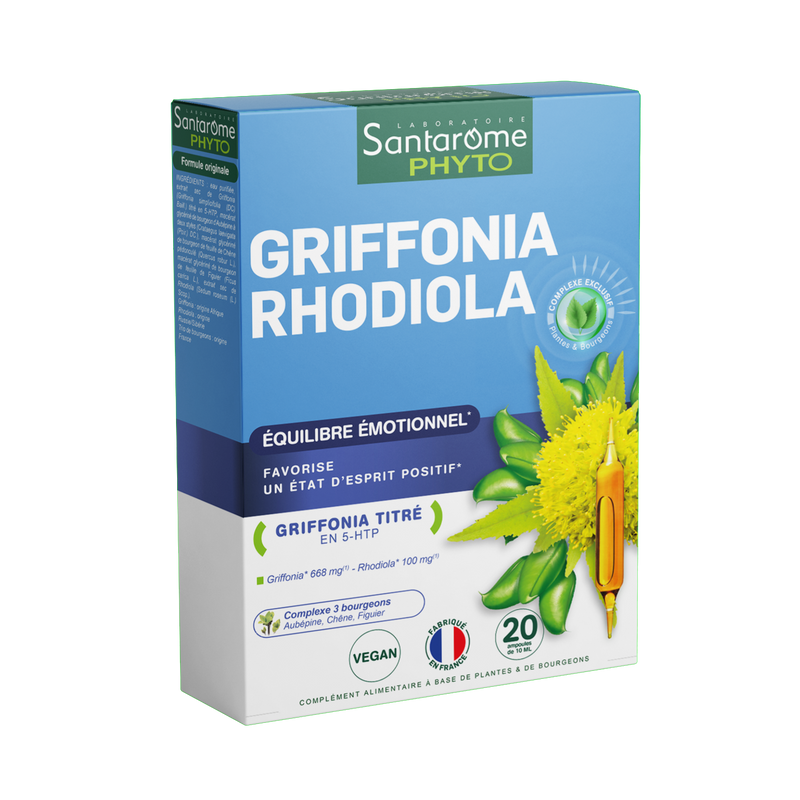The 5 best plants to effectively combat stress
Write the 06/12/2021 by Santarome Bio
Stress is the enemy pointed out when we feel tired, nervous or even in a gloomy mood. It can also be the cause of compulsive snacking and disrupted, non-restorative sleep ... Discover 5 plants with soothing properties to enjoy alone or in combination to combat stress and anxiety .
Plants to the rescue to better manage stress
Stress is a normal adaptation response of our body to external constraints and aggressions. If a stressful event is relatively short, the stress is generally positive. Indeed, it allows us to mobilize our resources quickly to deal with them. It then becomes a source of motivation and energy. But, when it persists over time, it exhausts us and harms our well-being. Behavioral problems can then occur: agitation , emotionality, irritability. When it takes up too much space in our daily lives, plants can guide us on the path to serenity.
Indeed, nature offers us numerous plants that are sources of natural active ingredients that promote relaxation. Some of them have been used for thousands of years in a traditional way to combat acute or chronic stress.
A brief overview of five anti-stress plants to adopt to calm anxiety and find serenity.
Griffonia, the plant of well-being par excellence
Griffonia simplicifolia seeds have been used for its health benefits for millennia in Africa. The discovery of its incredible richness in 5-hydroxytryptophan (5-HTP) led to a new craze around this plant in the 1980s. This amino acid is involved in the production of serotonin, the happiness hormone. Griffonia simplicifolia , a source of well-being, contributes to the proper functioning of the nervous system by improving brain activity. Thanks to these soothing and anti-stress properties, griffonia acts favorably during emotional stress and to restore morale.

Rhodiola, against stress-induced fatigue
She was the one who gave strength to the Vikings! Originally from Siberia, rhodiola (Rhodiola Rosea) is a precious ally with antioxidant and adaptogenic properties. In fact, this plant increases the body's capacity for adaptation and resistance to the stress it faces. The rhizome is the part used in herbal medicine due to its exceptional composition of active ingredients (including rosavin and salidroside).
By regulating the nervous system, this plant acts on stress-induced fatigue. It thus promotes good performance and physical conditions.
In addition, it helps to reduce the inconvenience of stress on the body, particularly during periods of overwork. Think about it this winter to effectively combat physical and seasonal fatigue!

Saffron, a spice with relaxing properties
Nicknamed “red gold”, saffron is a soothing spice which contributes to well-being and contributes to relaxation. This spice extracted from the Crocus sativus plant helps reduce nervousness . It preserves good emotional balance and a positive mood. Its relaxing effect helps reduce sleep disorders associated with anxiety. Indeed, saffron has proven effective against stress and low morale. Supplementing with 15.5 mg per day of saffron provides better quality sleep and faster falling asleep, according to a recent study.(1)
Its benefits don't stop there! Some stressed people also experience episodes of compulsive snacking. Saffron can then help reduce these sweet cravings as part of a slimming program.

Hawthorn, to help calm the nerves
Hawthorn (Crataegus oxyacantha) is useful in managing stress. By reducing nervousness and reducing agitation, it allows you to effectively fall asleep.
It is generally the hawthorn bud that is used. We then speak of gemmotherapy, when we use the embryonic tissues of plants. The buds have the advantage of being highly concentrated of all the natural active ingredients of the plant.

Chamomile, a sedative and soothing flower
Acting favorably on the nervous system, this flower with its beautiful yellow and white flowers is known to contribute to optimal relaxation. His prowess? Nervous and muscular relaxation, and good sleep. Indeed, sleep disorders, such as difficulty falling asleep, can appear when our nerves are put to the test. By helping with relaxation before night, chamomile improves the quality of sleep.

Recognized for their virtues, these sedative plants appear to be natural and effective solutions for finding calm. They help to sustainably improve the inconveniences linked to stress. Anti-stress plant-based food supplements are useful when stress invades our daily lives, accompanied by good lifestyle habits.
Source :
(1)Barbara D Pachikian, Sylvie Copine, Marlène Suchareau, Louise Deldicque. Effects of Saffron Extract on Sleep Quality: A Randomized Double-Blind Controlled Clinical Trial. Nutrients. 2021 Apr 27;13(5):1473. doi:10.3390/nu13051473. PMID: 33925432; PMCID: PMC8145009.

















